
Top Chemistrygraduate schools

Top Chemistry graduate schools
Looking for the top Chemistry graduate schools? We put together a comprehensive list of the best graduate programs for Chemistry, and put the results below. We include the acceptance rate, average GRE scores, and a brief description of each - all the information you need to kick start your research. Read on!
Table of contents
11.Conclusion
California Institute of Technology Chemistry school acceptance rate
California Institute of Technology's Chemistry acceptance rate is 10.00%.
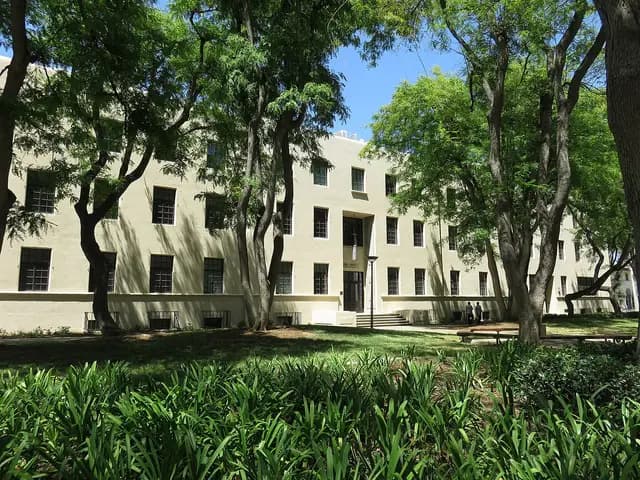
Antony-22 / Wikimedia Commons / "Thomas Laboratory Caltech 2017" / CC BY-SA 4.0
The chemistry program at Caltech offers in-depth education in various areas of chemistry, including organic and inorganic chemistry, chemical physics, theoretical chemistry, and chemical biology. Research opportunities cover chemical synthesis, catalysis, reaction mechanisms, biochemistry, and materials chemistry. Normally, Caltech does not admit students for a Master of Science (M.S.) degree, but exceptions can be made with prior approval. The M.S. degree in Chemistry requires completion of graduate-level courses, participation in a research project supervised by a faculty member, and submission of a satisfactory Master's Thesis. The thesis must be supported by at least 45 units of chemical research and should meet formatting guidelines and approval requirements outlined by the Graduate Office.
Harvard University Chemistry school acceptance rate
Harvard University's Chemistry acceptance rate is 24.00%.
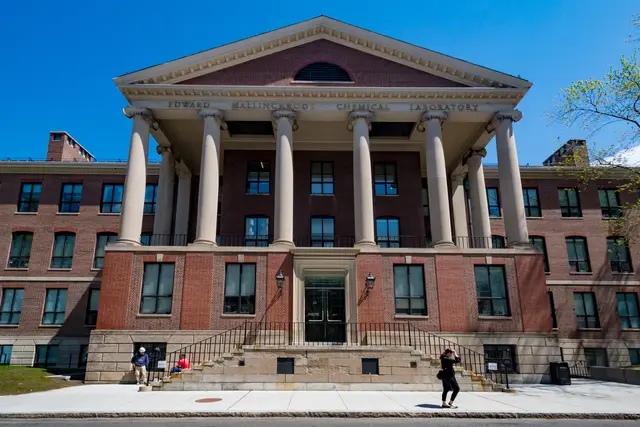
xiquinhosilva / Wikimedia Commons / "Mallinckrodt Laboratory, Harvard" / CC BY 2.0
The Chemistry and Chemical Biology program at Harvard University is part of the Harvard Integrated Life Sciences initiative, fostering collaboration and interdisciplinary research. Students gain expertise in chemical inquiry and molecular-level investigation. The program features a distinguished faculty, including Nobel Prize and Welch Award laureates. Students have access to cutting-edge instrumentation and collaborations with institutions like the Broad Institute and the Howard Hughes Medical Institute. Research projects range from gene editing to advanced imaging systems. Graduates secure faculty positions at prestigious institutions or pursue successful careers with pharmaceutical companies such as Pfizer and GlaxoSmithKline. The program provides a strong foundation for thriving in the chemical and life sciences.
Massachusetts Institute of Technology Chemistry school acceptance rate
Massachusetts Institute of Technology's Chemistry acceptance rate is 18.00%.
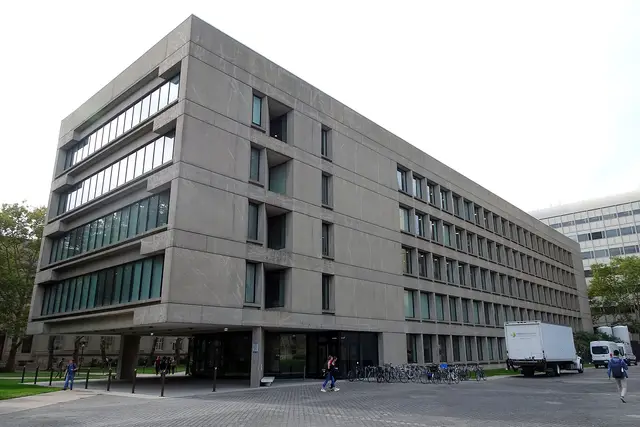
Alacoolwiki / Wikimedia Commons / "MIT Building 18 (Dreyfus Building)" / CC BY-SA 4.0
The MIT Department of Chemistry graduate program is renowned for its excellence in education and research, fostering an inclusive and innovative community. With a rich history of pioneering advancements in chemical research, the department integrates these achievements into its educational mission. Chemistry serves as a foundational science, contributing to diverse areas such as sustainable energy, biomedical research, environmental improvement, and material development. Collaborations with interdisciplinary laboratories and programs offer students opportunities to engage in cross-disciplinary research. Moreover, the department prioritizes the well-being of its graduate students through activities promoting work-life balance, including intramural athletics, yoga classes, and social events.
Northwestern University Chemistry school acceptance rate
Northwestern University's Chemistry acceptance rate is 27.00%.
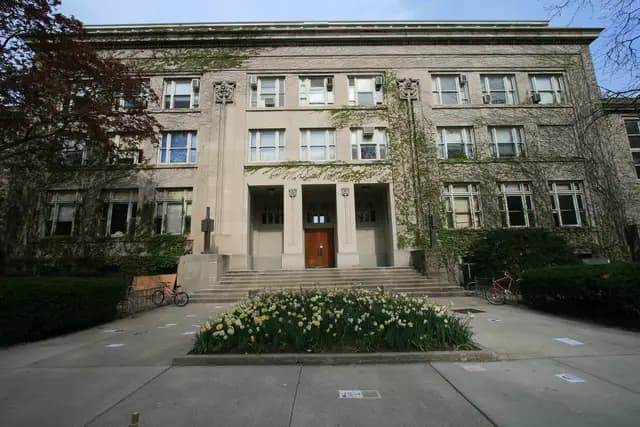
Madcoverboy at English Wikipedia / Wikimedia Commons / "Swift Hall at Northwestern" / CC BY-SA 3.0
The Department of Chemistry prioritizes graduate education and research at the forefront of the field, equipping students for research positions in academia or industry. They offer advanced courses, seminars, and research opportunities covering various branches of chemistry, such as inorganic, organic, physical, and biological chemistry. The department actively promotes interdisciplinary research in materials chemistry, environmental chemistry, and the chemistry of life processes. Collaboration between students and faculty extends to several research centers on campus, including the Materials Research Science and Engineering Center (MRSEC), Center for Catalysis and Surface Science, International Institute for Nanotechnology (IIN), Argonne-Northwestern Solar Energy Research Center, Chemistry of Life Processes Institute (CLP), Center for Molecular Innovation and Drug Discovery (CMIDD), and the Center for Bio-Inspired Energy Science (CBES).
Princeton University Chemistry school acceptance rate
Princeton University's Chemistry acceptance rate is 10.00%.
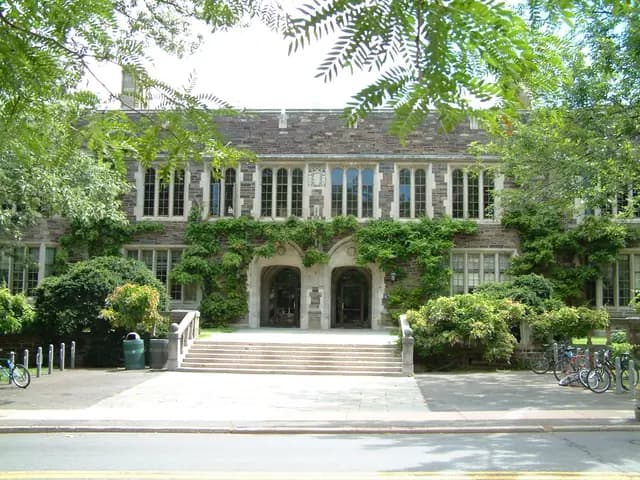
Quantockgoblin 18:08, 2 December 2006 (UTC) / Wikimedia Commons / "Princeton University Frick Lab" / Public domain
The Department of Chemistry at Princeton University provides a Ph.D. program with a diverse community of approximately 165 graduate students and 120 postdoctoral researchers, visiting faculty, and senior scholars. Research in various chemistry fields is pursued both within the department and in collaboration with other departments and programs on campus. The program offers interdisciplinary and collaborative research opportunities, with a focus on areas such as catalysis, organic synthesis, chemical biology, inorganic chemistry, physical experimental chemistry, theoretical and computational chemistry, and materials chemistry. Students benefit from faculty mentoring, access to resources, and the opportunity to pursue individualized programs. The program culminates in a thesis-based research project and a public oral examination for the Ph.D. degree. A Master of Science program is also available for select industry-sponsored candidates.
Scripps Research Institute Chemistry school acceptance rate
Scripps Research Institute's Chemistry acceptance rate is 13%.
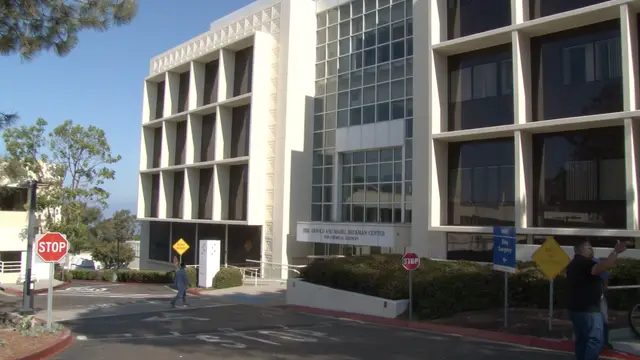
Biomedicalbuff / Wikimedia Commons / "Beckman exterior TSRI" / CC BY-SA 4.0
The Scripps Research Institute's Graduate Program offers an interdisciplinary "Doctoral Program in Chemical and Biological Sciences" at its campuses in La Jolla, California, and Jupiter, Florida. With over 300 students, the program emphasizes an interdisciplinary approach to education and provides mentorship from more than 200 scientific faculty members, including Nobel Laureates. Accredited by the Western Association of Schools and Colleges (WASC) Senior College and University Commission since 1993, the program offers research opportunities, seminars, and professional development workshops. Advanced broadcasting technologies ensure seamless connectivity and interaction between students and faculty across both campuses, fostering a vibrant research community.

Achievable GRE - $199
Hit your GRE target score on the first try with Achievable's interactive online exam preparation course. Includes everything you need: unlimited quantitative practice questions, an easy-to-understand online textbook, 24 verbal / reading comprehension practice exams, 250 vocabulary words, and unlimited instant essay grading.
Easy-to-understand online textbook
Infinite randomized questions
200+ quant templates
30+ verbal sections
250 vocab words
Unlimited essay grading

Stanford University Chemistry school acceptance rate
Stanford University's Chemistry acceptance rate is 3.95%.
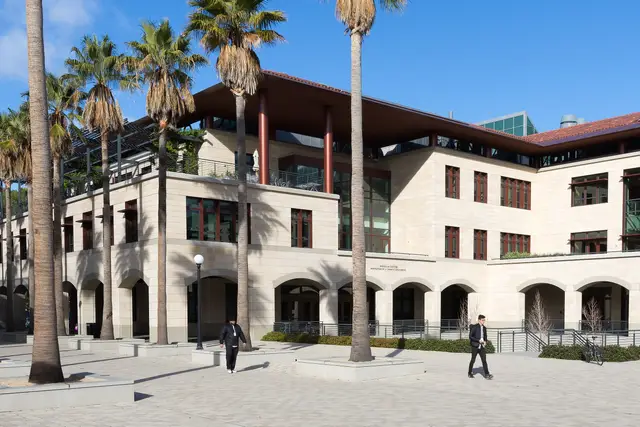
Frank Schulenburg / Wikimedia Commons / "Shriram Center, Stanford University" / CC BY-SA 4.0
The Master of Science program in Chemistry at Stanford University is only available to its current Ph.D. students and through a coterminal program. Applicants must complete a minimum of 45 graduate-level units and an M.S. thesis in addition to their bachelor's degree requirements. With a student-faculty ratio of 5:1 and 69.3% of classes having fewer than 20 students, Stanford offers an intimate learning environment. The university has 17 Nobel laureates and is ranked second globally by QS Global World Ranking. The Department of Chemistry provides diverse opportunities for graduate study, covering various subfields. Academic advising is crucial, with regular meetings, yearly development plans, and timely feedback between advisers and students.
University of California, Berkeley Chemistry school acceptance rate
University of California, Berkeley's Chemistry acceptance rate is 9.30%.
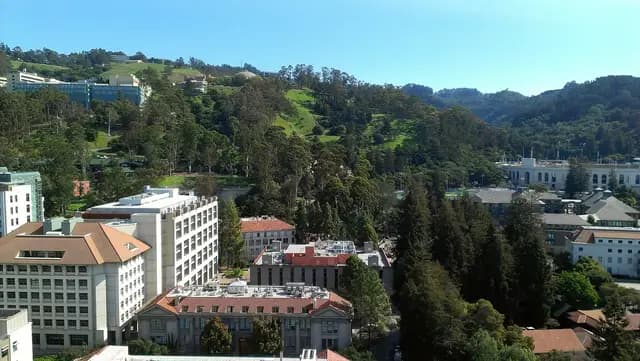
Firstcultural / Wikimedia Commons / "UC-Berkeley-018-college-of-chemistry" / CC0
The Chemistry PhD program prioritizes the development of creative scientific research skills in its students. The main focus of the curriculum is the individual research project, which allows students to engage in independent study. Course requirements are minimal and tailored by advisors to best prepare students for their chosen research field. The program offers concentrations in Physical Chemistry, Synthetic Chemistry, and Chemical Biology, each with specific degree requirements. Students select their research projects after consulting with faculty members and conducting literature reviews. The program includes independent study, seminars covering various topics, a qualifying exam, and teaching assistantships. Financial aid in the form of stipends, tuition waivers, and insurance coverage is provided to all admitted students.
University of Chicago Chemistry school acceptance rate
University of Chicago's Chemistry acceptance rate is 28.00%.
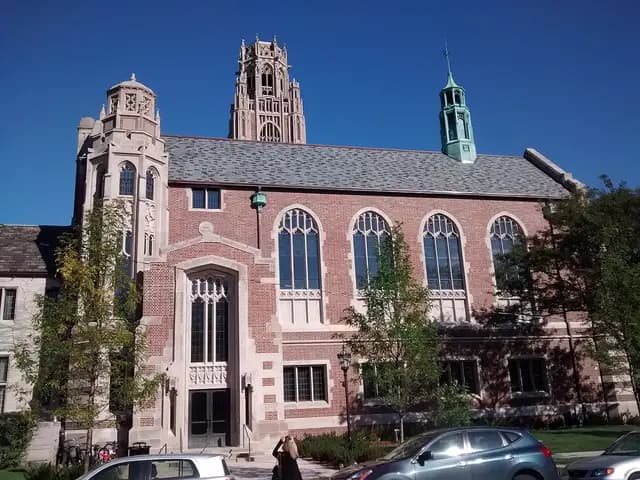
Mx. Granger / Wikimedia Commons / "Saieh Hall for Economics" / CC0
The Department of Chemistry at the University of Chicago offers a flexible and interdisciplinary graduate program. Students have the freedom to choose their research advisor early on and engage in research by spring. There are no cumulative or major examinations, and students can take courses in other departments, even earning a chemistry degree for research done under the supervision of faculty from other departments. In the first year, students must complete six graduate-level courses with a B average, undergo basic examinations, and participate in presentations and lab rotations. By the second year, students prepare for the Ph.D. candidacy examination, presenting a research prospectus for admission to candidacy.
University of Illinois, Urbana-Champaign Chemistry school acceptance rate
University of Illinois, Urbana-Champaign's Chemistry acceptance rate is 39.00%.
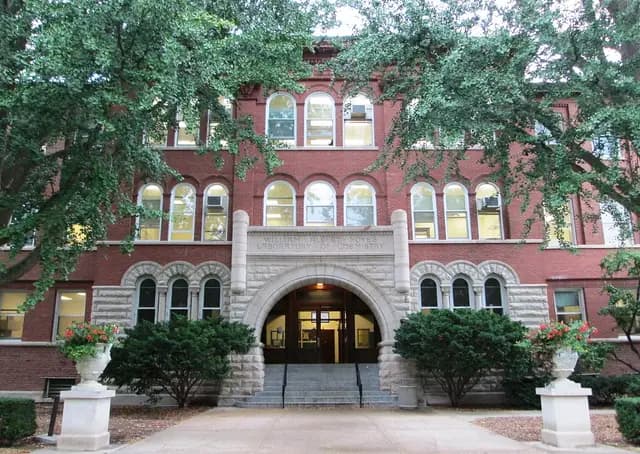
Beyond My Ken / Wikimedia Commons / "William Albert Noyes Laboratory of Chemistry University of Illinois at Urbana-Champaign" / CC BY-SA 4.0
The Department of Chemistry offers a PhD program with requirements including coursework, research, teaching, and examinations. Students can choose their research advisor and begin their research in the first year. The department provides diverse research opportunities in Analytical, Chemical Biology, Inorganic, Materials, Organic, and Physical chemistry. The formal course requirement can be fulfilled in about two years, with flexibility in course selection. Students are expected to participate in departmental seminars and present a talk in their second year. The preliminary exam evaluates research progress, while the final exam involves an oral presentation of the thesis project. Teaching assistant duties are assigned based on student backgrounds and interests. The degree awarded upon completion is the Doctor of Philosophy in Chemistry.
Conclusion
And there you have it - the top Chemistry graduate schools. These are some of the best schools in the country for Chemistry, and admission into any of them would be a great accomplishment that could set you up for a strong career. Good luck!
Interested in the top graduate schools for other programs?

Hit your target score
Achievable is the best online GRE exam prep course: effective, personalized, and convenient. With Achievable, you'll spend less time studying and hit your target score with confidence.